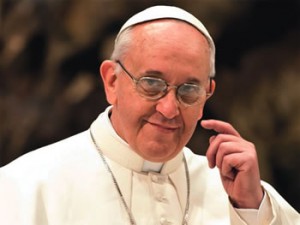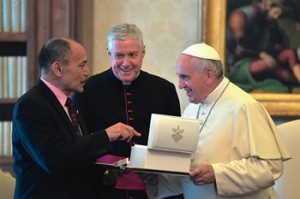On Peace, and Receives Governor General
 Challenges to Peace: Arms Trade, Forced Migration
Challenges to Peace: Arms Trade, Forced Migration
The Holy Father focused his address to the diplomats on the challenges posed to peace by the arms trade and forced migration.
“Peace: this word summarises all the assets to which every person and all human societies aspire”, he said. “Also the effort with which we seek to promote diplomatic relations has, in the final analysis, the sole aim of allowing peace to grow in the human family, in development and justice. It is a target that is never fully reached, and that must be continually sought after by every generation, facing the challenges presented in every age”.
“Everyone talks about peace”, he observed; “everyone claims to want it, but unfortunately the proliferation of weapons of every type leads in the opposite direction. The arms trade has the effect of complicating and distancing us from a solution to conflicts, all the more so since it takes place to a great extent outside the boundaries of the law. Therefore I consider that, while we are gathered in this Apostolic See, which by nature is invested in a special service to the cause of peace, we can unite our voices in expressing hope that the international community may make new, concerted and courageous efforts against the proliferation of weapons and to promote their reduction”.
The Holy Father mentioned that another challenge to peace, which “unfortunately takes on, in certain regions and in certain moments, the nature of a full-blown human tragedy”, is that of forced migration. He commented that it is a very complex phenomenon, and recognised that important efforts are being made by international organisations, States, and social bodies, as well as religious communities and volunteer groups, to respond “in a civil and organised way to the most critical aspects, emergencies, and situations of greatest need”. However, also in this case, “we are aware that we cannot limit ourselves to reacting to emergencies. This phenomenon has fully manifested its epochal character. The moment has arrived to face it with a serious and responsible political outlook, involving all levels: global, continental, macro-regional, in relations between nations, and finally at national and local levels”.
In relation to this problem we see examples of a contrary nature: on the one hand, “marvellous cases of humanity, of welcome, of encounter: people and families who have succeeded in leaving behind these inhuman situations and have rediscovered dignity, freedom and security. Unfortunately, on the other hand there are stories that make us weep for shame: human beings, our brothers and sisters, children of God who, inspired by the wish to live and work in peace, face harrowing journeys and are subjected to blackmail, torture and harassment of every kind, and at times end up dying in the desert or at the bottom of the sea”.
The phenomenon of forced migration is “closely linked to conflicts and wars, and therefore also to the problem of the proliferation of weapons. … They are the wounds of a world that is our world, in which God has placed us to live today, and He calls us to be responsible for our brothers and sisters, so that the violation of no human being tolerated. It would be an absurd contradiction to speak about peace, to negotiate peace, and at the same time promote and permit the arms trade. We could also consider it to be in a certain sense cynical to proclaim human rights and at the same time ignore or fail to take account of the men and women who, forced to leave their homeland, die in the attempt or are not welcomed by international solidarity”.
The Pope concluded, “The Holy See today declares to you and to the governments of your respective countries its firm resolve to continue to collaborate to take steps forward in these areas and along all the roads that lead to justice and peace, on the basis of universally recognised human rights”. (VIS) 15 May.
Francis Receives the Governor of New Zealand
Vatican City, 15 May 2014 (VIS) – Today the Holy Father Francis received in audience the Governor General of New Zealand, Sir Jerry Mateparae, who subsequently went on to meet with Cardinal Secretary of State Pietro Parolin, accompanied by Archbishop Dominique Mamberti, secretary for Relations with States.
During the cordial discussions the parties focused on a number of aspects of the social and economic life of the country, as well as the valuable contribution of the Catholic Church in various sectors of New Zealand society. There was also an exchange of opinions on the international situation, with particular reference to regional cooperation in various development programmes and participation in peace missions in different parts of the world.

 Entries(RSS)
Entries(RSS)